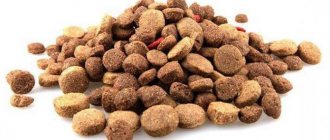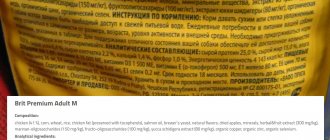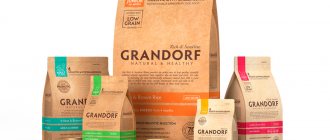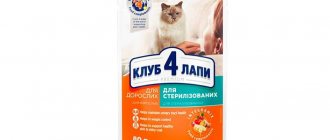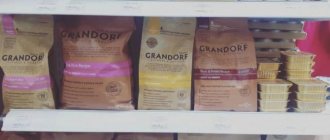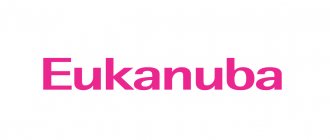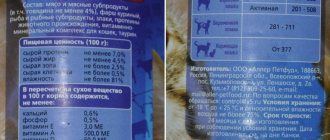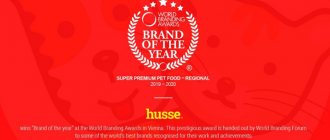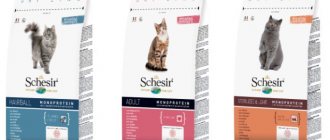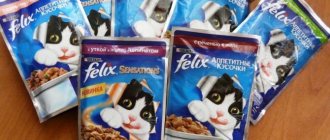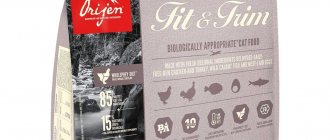General characteristics of Orijen food
Orijen food is produced by Champion Petfoods LP, which has been manufacturing pet food for several decades. In addition to the line for cats, Orijen also has a line for dogs. In addition, Champion Petfoods LP produces a series of foods called Acana. "Acana" is a more affordable food that differs from "Origen" in several respects:
- Orijen contains about 85% meat products, Akana contains at least 10% less;
- the amount of proteins in Acana is also less than in Orijen by about 10%;
- the percentage of fresh meat content in Orijen is about 66%, in Akana it is half as much;
- carbohydrate levels in Acana are slightly higher than in Orijen.
Acana and Orijen are products of the same company
The official website for Orijen products is: www.orijen.ca. The resource is also available in Russian. You can also get acquainted with the feed on the website: www.acana.ru.
Manufacturer
The company Champion Petfoods LP is located in Canada, its founder is considered to be Reinhard Muhlenfeld, who in 1975 acquired a mill and became interested in the process of making food for pets. A decade later, his products were in mass production. Today, Champion Petfoods LP is one of the leading pet food companies.
Feed class
The product is considered holistic food. The manufacturing company tries to produce food that is biologically consistent with the nutrition that animals were fed with during evolution. Therefore, the products contain only natural ingredients. The food is produced only in Canadian factories using raw materials from local farms. Product release occurs under the strictest supervision, which can be considered a guarantee of quality. That is why Orijen food has received the largest number of awards in various categories among all food brands:
- Washington State Glycemic Research Institute selected ORIJEN as Food of the Year in 2009-2010, 2010-2011 and 2011-2012;
- Rate It All, the largest consumer review website in the United States, named ORIJEN food of the decade;
- ORIJEN food has received the approval of the American magazine The Whole Dog Journal, which is known for its objective critical articles about animal food;
- in 2008, Champion Petfoods received one of the most prestigious awards in the world - “Entrepreneur of the Year” - as a world-class advanced manufacturer;
- ORIJEN was voted Best Holistic Pet Food in 2012 by Nashville Paw Magazine readers.
Orijen Dog Food Review
The best ready-made food is holistic dog food, which includes the Orijen brand. This indicates the following: we have a high percentage of meat, no by-products, vegetables, fruits, berries and herbs are the source of vitamins and other useful elements. Orijen dog food is manufactured in Canada by Champion Petfoods (the same company that makes Acana food). In general, no chemicals, everything is high quality and natural:
- The source of proteins is fresh chicken, turkey, lake fish (pike perch, salmon, whitefish, trout, burbot), ocean herring and whole eggs.
- The source of vitamins is a variety of vegetables, fruits and berries (potatoes, sweet potatoes, apples, sunflowers, black currants, cranberries, etc.).
- Specially selected phytocomponents (dandelion root, chicory root, chamomile, medicinal fennel root, mint leaves, turmeric, etc.) also contribute to the dog’s excellent health.
Composition of Orijen dog food
You don't need to be an expert to check whether a food is really as good as they say it is. To do this, just compare the composition of Orijen dog food with, for example, the composition of Hills dog food. The second one is very praised on the Internet, but in practice it is much worse (therefore the price is much lower). Let's look at the composition of Orijen food using the Dog Adult Delivvered Fresh option as an example:
As we can see from the photo above (photo of the composition on the back of the food package) - meat comes first (the best source of proteins), then potatoes, peas and sweet potatoes (sources of carbohydrates). Then only the healthy stuff - whole eggs, pumpkin, carrots, spinach, apples, etc. In cheap food the picture is much worse (offal, corn, preservatives and certainly not such a range of vegetables, fruits and especially herbs).
The percentage of protein in Orijen food is about 38%. Many people believe that a high-protein diet is harmful, but there is essentially no scientific evidence for such assumptions.
Pros and cons of Orijen food
The undoubted advantages of the brand include:
- a lot of real, high-quality meat;
- vegetables, fruits, berries and even medicinal herbs;
- have all the necessary vitamins and minerals;
- Made in Canada where standards are high;
- no flavor enhancers or the like;
- Available in most pet stores, and certainly on the Internet.
The disadvantages of Orijen food include:
- high price (comparable to other holistic treatments).
Orijen food range
Only dry food and treats for cats are produced under the Orijen brand. Orijen does not have any wet products or medical nutrition lines.
Dry food
The Orijen dry food line has been updated in 2021. At the same time, the product recipe has also changed:
- the amount of meat has increased;
- the amount of raw meat has increased;
- there are more meat components in the composition;
- the percentage of protein content also became slightly higher.
Today dry food is available in five varieties:
- Cat and kitten. The food is suitable for kittens and cats of any age. It is made from turkey, chicken, herring, flounder, sardines, chicken eggs, as well as fruits and vegetables.
- Six fish. The food is designed for feeding adults and has a fish taste. Six types of fish are used to prepare it: herring, flounder, perch, pike perch, hake and sardine. Due to the high content of fatty acids, the food can help animals with poor hair and skin; if an animal has urolithiasis, it is better to abstain from this food.
- Fit and trim. The food is designed for feeding overweight animals and is low in calories. But this food option is contraindicated for pregnant cats. The composition includes chicken, turkey, fish (hake, flounder, herring), as well as chicken eggs.
- Tundra. The food is suitable for feeding adult cats. It can also be used for animals prone to allergies, since it does not contain a single “cat” allergen - corn, wheat, etc. It is made from fish (char, trout, mackerel, sardines), boar, goat, deer meat and ducks
- Regional red. The food is made from boar, bison, lamb and pollock meat. The product is not sold in the Russian Federation.
Dry food granules are round in shape and have a diameter of about 7–10 mm
Products are available in the following package sizes:
- 340 grams;
- 1800 grams;
- 5400 grams;
- 17 kilograms.
The cost for all dry food options is approximately the same, changing only depending on the volume of packaging:
- for 340 grams you will have to pay about 380 rubles;
- for 1.8 kg - from 1,700 rubles;
- for 5.4 kg - from 3,700 rubles;
- for 17 kg - from 11,000 rubles.
Composition of dry food
Orijen dry food is manufactured according to the WholePray principle, which means “whole prey”, that is, the meat is supplied to the product in the form in which the animal would have obtained it in the wild. This means that the ingredients are not meat in its pure form, but with internal organs (liver, heart) and cartilage. Such “supplements” are additional sources of vitamins and minerals.
The food contains only meat and plant products
Ingredient percentage:
- 85% - meat products and eggs;
- 15% - vegetables and fruits.
In addition to protein sources (meat products), which occupy about the first fifteen positions in the composition of the feed, it also contains:
- liver and heart - as a vitamin and mineral complex;
- chicken or fish oil - as a source of fatty acids;
- lentils - as fiber and carbohydrates;
- yellow and green peas, beans, beans, etc. - as sources of carbohydrates;
- apples, carrots, beets and other fresh fruits and vegetables are natural sources of fiber, vitamins and various nutrients;
- whole berry berries - vitamin P, which strengthens blood vessels and normalizes heart function;
- marshmallow root - can have an anti-inflammatory effect and normalize the functioning of the digestive system;
- lavender - has aseptic, diuretic and anticonvulsant effects.
Table: full composition and nutritional value of Orijen dry food
| Name | Compound | Energy value per 100 grams | Nutritional value |
| Cat and kitten | The food consists of the following ingredients:
| 406 kcal |
|
| Six fish | Feed ingredients:
| 412 kcal |
|
| Fit and trim |
| 371 kcal |
|
| Tundra |
| 412 kcal |
|
Photo gallery: Orijen dry food
Minimal heat treatment of the main ingredients, the absence of artificial components, as well as a composition balanced for real predators, automatically puts Orijen on the list of the best cat foods
The food granules are flat in shape - this prevents animals from swallowing pieces whole
Orijen is a low-carb, high-protein cat food that does not contain grains.
If the average pet requires about 100 grams of high-carbohydrate food per day, then the Orijen norm is 40–50 grams and can even be reduced for sedentary and sterilized pets
Orijen dry foods consist almost entirely of meat, and therefore are much more expensive than diets in which 50% or even more are grains
Treats for cats
In order for owners to pamper their picky pets, the Orijen brand has a line of dry treats for cats. There are no fruits, vegetables, or grains - only 100% meat. The product is made using the sublimation method - pieces of meat are dried at a temperature of about -50 degrees Celsius, which allows all valuable properties, as well as taste and smell, to be preserved in the product.
All treat packages have a zip lock closure to maintain product quality.
The treats are available in 35 gram bags and have several flavors:
- Original - made from chicken, turkey and flounder;
- Six Fish - from six types of fish: flounder, perch, hake, sardine, mackerel and two-line flounder;
- Tundra - from the meat of wild boar, goat, deer and fish;
- Romney Lamb - made from lamb meat;
- Wild Boar - made from wild boar meat;
- Regional Red - made from lamb, wild boar, pork, beef and lamb.
The treats are in the form of oblong granules about 1.5 centimeters long. Each piece contains approximately 1 kcal. The nutritional value of all delicacy options is approximately the same and has the following percentage:
- proteins - 45% (in Six Fish - 58%, in Romney Lamb - 40%);
- fats - 35% (in Six Fish - 22%, in Romney Lamb - 40%);
- fiber - 1%;
- humidity - from 2 to 5%;
- ash - from 9%.
Treats are made only from meat ingredients
The cost of treats is from 300 rubles per package. The Regional Red flavor is not sold in the Russian Federation.
Table: composition of Orijen cat treats
| Name | Compound |
| Original |
|
| Six Fish |
|
| Tundra |
|
| Romney Lamb |
|
| Wild Bear |
|
Photo gallery: Orijen treats
The share of treats should be no more than 10% of the total diet
Freeze-dried meat is the safest treat for cats
All ingredients for the treat are delivered to the factory fresh and do not contain preservatives.
Orijen treats are made from wild-raised animals
ORIJEN cat treats are not a complete food, they are used as a supplement to the main diet
Orijen treats are also suitable for kittens
Orijen replacement food
If for some reason the owner needs to switch the animal to another food after Orijen, then it is worth choosing a product of a similar or better class. In this case, you will need to choose food:
- from holisticists;
- premium class;
- super premium class.
Table: how to replace Orijen food
| Feed class | Product name | Manufacturer country | Type of feed | Features and Benefits | Price |
| Premium | Purina Pro Plan | France | Dry and wet | The food is easy to find in stores, and its price is quite affordable. The product line is quite diverse, there is a series of veterinary foods. | The price depends on the volume and type of feed:
|
| Premium | Brit Premium | Czech | Dry and wet | The food contains a large percentage of meat (for its class), and the price, on the contrary, is one of the lower. In addition, the composition contains no artificial preservatives. | Wet food is sold in 100 gram pouch bags - from 63 rubles, dry food - in packages:
|
| Superpremium | Flatazor | France | Dry | The advantages of the product include:
| The cost depends on the volume of packaging:
|
| Superpremium | Monge | Italy | Dry and wet | The main source of protein is meat. Contains many vitamins and minerals, no artificial preservatives or antioxidants. Among other things, the food is quite common in Russia and has a reasonable price. | Prices for Monge feed:
|
| Holistic | Grandorf | Belgium | Dry and wet | Contains no by-products, plants, corn or wheat | Product prices:
|
| Holistic | Power of Nature | Germany | Dry and wet | The main source of protein is meat products. In addition, the composition does not use artificial preservatives, as well as wheat, corn and gluten. | In Russia you can only buy dry food of this brand. Their cost:
|
Photo gallery: replacement feed
The wide range of Purina Pro Plan food is designed taking into account the individual needs of pets, so among them you will be able to find the one that suits your pet.
Brit Premium is an excellent combination of affordable price and high quality
The peculiarity of Flatazor is that the production of feed takes place on the latest equipment, characterized by good heat treatment, which allows you to preserve all nutrients
The company that produces Monge products guarantees high quality feed, as it carries out careful control at every stage of production: from the selection of ingredients to the packaging of finished products.
Grandorf is a cat food positioned as holistic, produced in Europe according to customer recipes, and sold only in Russia
Power of Nature dry food has been sold in Russia for many years, but only in some pet stores
Reviews of Orijen dog food
Review of Orijen dog food , writes Anastasia from Perm. Hi all! I have a Yorkshire terrier or just a Yorkie, a very cool dog and I love him very much. Therefore, I approached the choice of food very seriously and read many articles and forums. A lot of people praised Orijen and Acana food, I decided to try the first one, it is completely grain-free. I immediately bought a large package (7 kg), and it really turns out cheaper (I was a little afraid that it might not fit, but it did). This package lasted us for half a year, during which time there were no problems. Now we are finishing the second package
